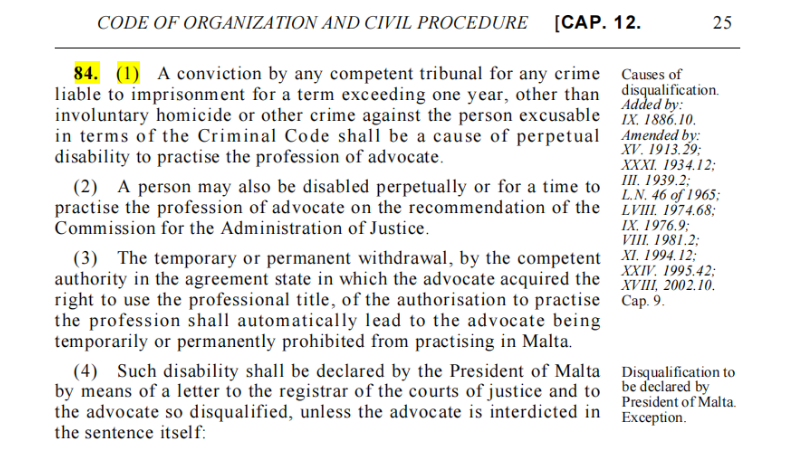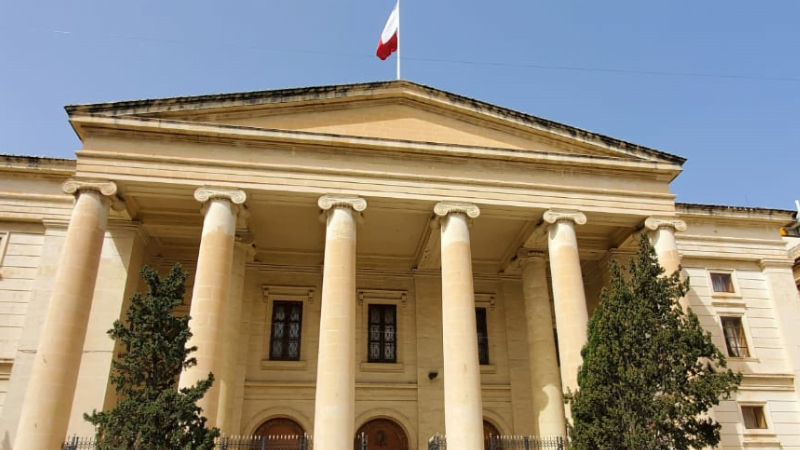Following concerns about whether a former Gozitan priest found guilty in 2017 of violent sexual assault of a 13-year old girl would be able to practise law after finishing a degree in law he started two years ago, the Chamber of Advocates has clarified that the granting of a warrant takes into consideration other factors, such as good conduct and good morals.
“Simply obtaining a degree in law from the University does not automatically entitle anyone to a warrant of advocate,” the Chamber’s spokesperson said.
“Without entering into the merits of individual cases, as the law stands today any person has to satisfy the Committee for Advocates and Legal Procurators that he or she is a fit and proper person to be recommended to the President for a warrant to be issued,” the spokesperson said.
The Committee for Advocates and Legal Procurators was set up with the intent of establishing a body which regulates the profession. The legal framework for its set up, however, was criticised by the Chamber for leaving ambiguities open in terms the criteria which allow one to qualify for a warrant besides a law degree.
“The Committee still needs to issue guidelines on the fitness and properness criteria to be adopted for this purpose,” the Chamber said in its responses.
“In addition, a person cannot be so recommended unless he is of good conduct and good morals, and is not or has not engaged in or is not or has not been associated with any activity or practice which in the view of the Committee is not compatible with the exercise of the legal profession or has not otherwise conducted himself in such a manner which casts doubt on his honesty and integrity,” it added.
The Shift’s report on Gauci’s admission to the course, published a week ago, revealed that the former teacher has a 2017 conviction for violently assaulting a teenage girl and other crimes. The education ministry revoked his warrant to teach.
Gauci was given a one-year suspended sentence, which meant he was able to apply to join the law course despite University rules stating that any prospective student must present a clean certificate of police conduct because suspended sentences are not listed on conduct certificates.
After he finishes his three-year law degree course, Gauci would then have to apply to the Masters course, following which he could then obtain a warrant, if his application is approved by the Committee for Advocates and Legal Procurators.
“A criminal conviction could well be a matter that would cast doubt on a person’s honesty and integrity,” the Chamber said when asked whether Gauci’s record would prevent him from obtaining such a warrant.
“This must also be seen in the context of the provisions of Article 84(1) of the Committee which requires that an advocate will be disqualified in perpetuity if he is no longer a fit and proper person or if an advocate is convicted of a crime affecting public trust, or theft or fraud, or any other offence that is punishable by imprisonment for a term exceeding one year, with the exception of involuntary offences,” it added.

Code of organisation and civil procedure – Chapter 12, Article 84 (1).
In light of that, the Committee should not be able to pass on a recommendation to the President on behalf of Gauci, were he ever to seek to obtain a warrant after he finishes his law degree.
“What is important is that simply obtaining a degree in law from the University does not automatically entitle anyone to a warrant of advocate. It is a prerequisite in terms of academic qualification, but there are other conditions that need to be satisfied,” the Chamber’s spokesperson said.
In a letter sent to The Shift over the previous article written about Gauci, his lawyer, Carmelo Galea, argued that the girls who pressed charges against Gauci were all teenagers and that he had not been found guilty of the charges levelled against him in two of a total of three cases which had been brought forth against him. Gauci was found guilty of violent sexual assault against a 13-year old girl, among other criminal acts, in the third case.
“The three girls in relation to whom charges were pressed against Mr Gauci were all teenagers and therefore, by definition those charges cannot, by any stretch of the imagination, be classified as ‘paedophilia’,” Gauci’s lawyer stated.













Why should it be the President to issue warrants to lawyers after approval from the Committee for Advocates and Legal Procurators. There should be one office that issues all warrants after recommendation from respective committees.